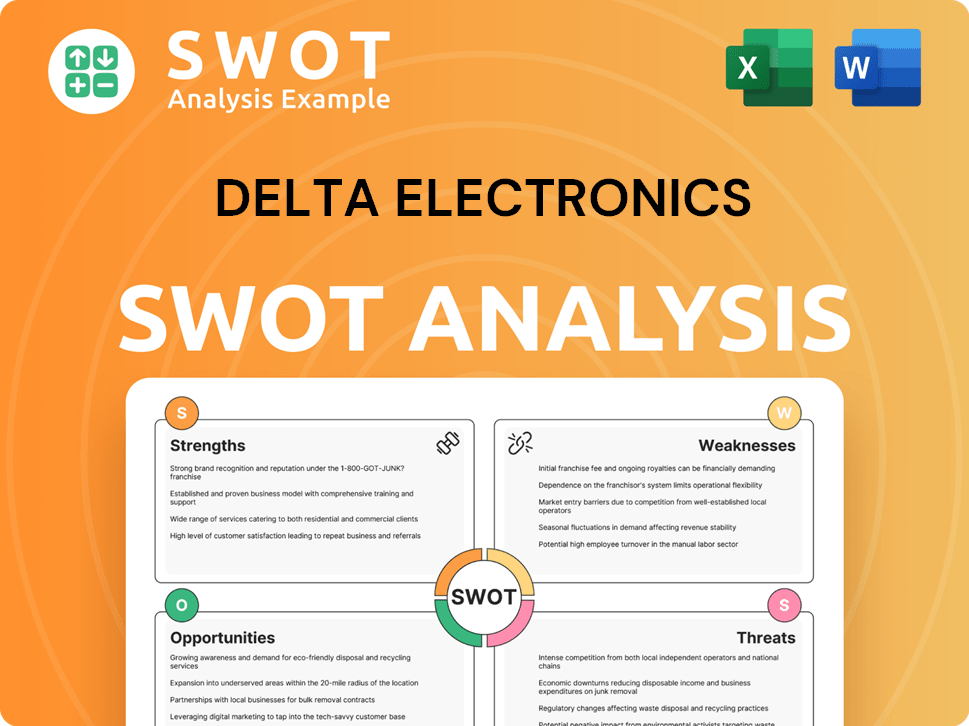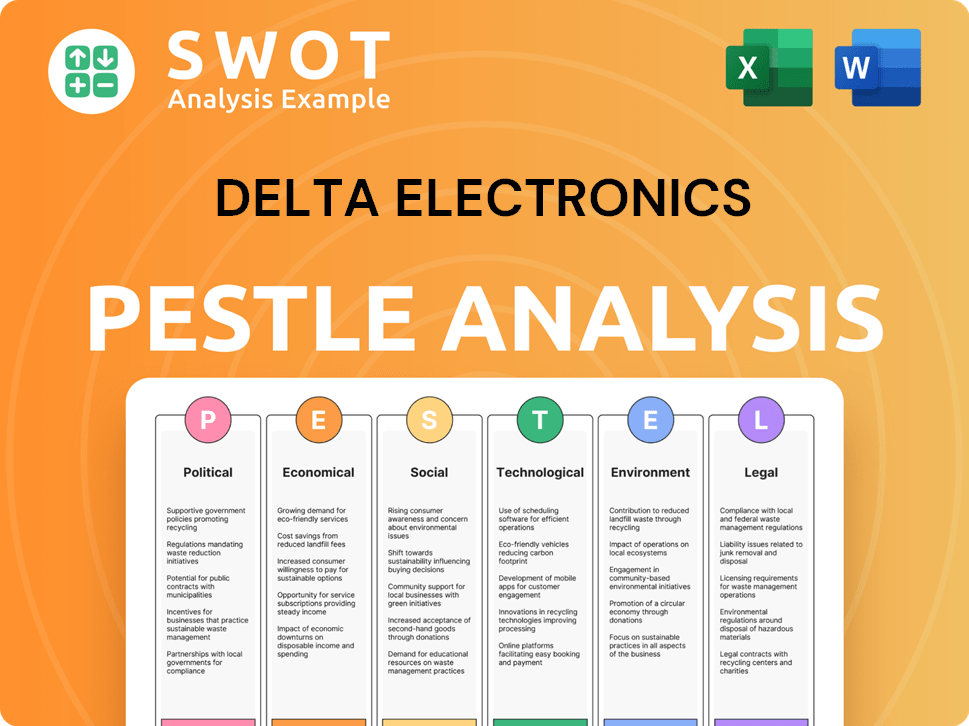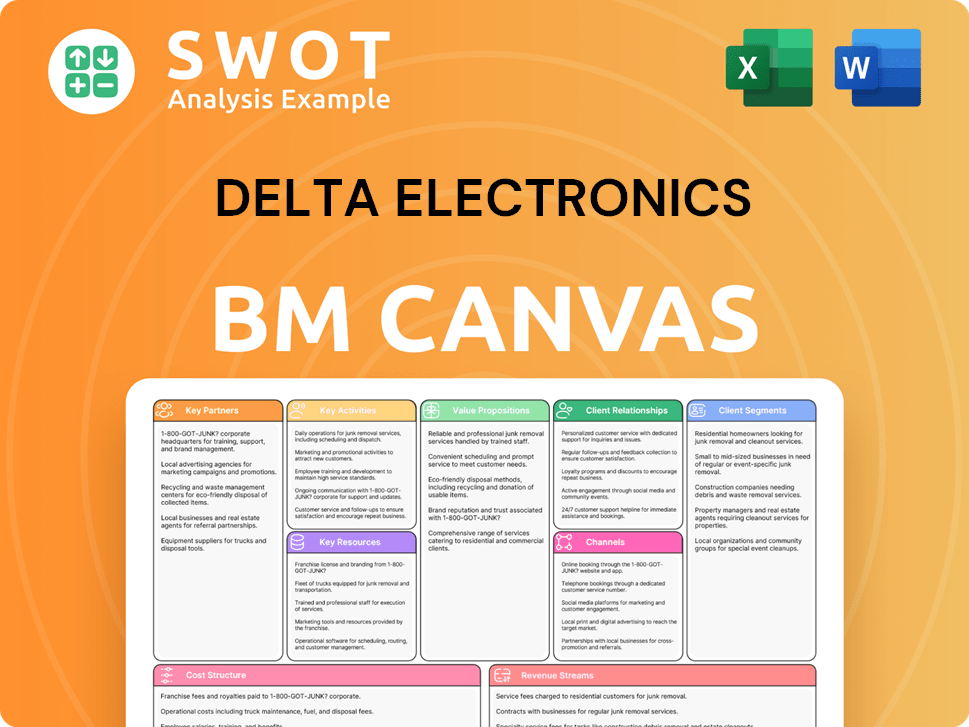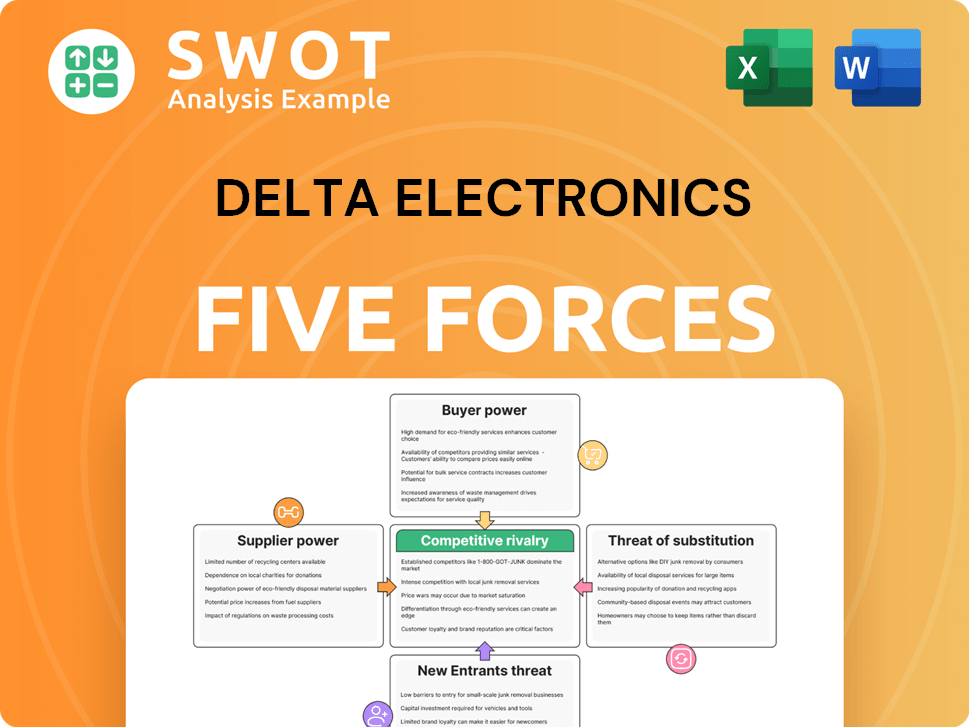Delta Electronics Bundle
Who Really Owns Delta Electronics?
Understanding the ownership structure of Delta Electronics is key to grasping its strategic moves and global influence. From strategic investments to acquisitions, Delta's ownership dictates its market position and future ambitions. For example, in January 2025, a significant investment highlighted a clear strategic direction.

Delta Electronics, a global leader in power and thermal management solutions, has a fascinating history, starting with its founder, Bruce C.H. Cheng, in 1971. With a market cap of approximately US$35.12 billion as of June 2025, understanding Delta Electronics SWOT Analysis is crucial. This exploration will reveal the company's ownership evolution, from its initial stake to key investors and public shareholders, offering a comprehensive look at who owns Delta Electronics, its parent company, and its subsidiaries.
Who Founded Delta Electronics?
The story of Delta Electronics begins in 1971, when Bruce C.H. Cheng established the company. He started with a small team of just 15 employees and a modest capital of NT$300,000 in a factory located in Taiwan. This marked the beginning of what would become a significant player in the electronics industry.
Initially, Delta Electronics focused on manufacturing TV coils and electronic components. Bruce C.H. Cheng served as Chairman until 2012, guiding the company with a clear vision. This vision centered on providing innovative, clean, and energy-efficient solutions, which has been a cornerstone of the company's mission.
While specific details about the initial equity distribution are not widely available, Bruce C.H. Cheng is recognized as the founder and driving force behind Delta Electronics. His leadership played a crucial role in shaping the company's direction from its inception. The company's early focus on electronic components aligned with the booming information technology sector.
Bruce C.H. Cheng's vision extended beyond immediate profits, as evidenced by the establishment of the Delta Electronics Foundation in 1990.
The foundation invested in scientific and technological research, talent education, and environmental protection.
Mr. Cheng earned titles like 'Chief Environmental Officer' and 'The Godfather of Taiwan's Tech' from Taiwanese media.
There are no significant early ownership disputes or buyouts documented, indicating a stable founding period under Cheng's leadership.
The company initially focused on electronic components for the IT industry.
This early focus suggests a strategic vision aligned with emerging market demands.
Understanding the early ownership of Brief History of Delta Electronics provides insights into the company's foundational values and strategic direction.
- Bruce C.H. Cheng, the founder, played a central role in the company's early success.
- The company's commitment to innovation and sustainability was evident from the beginning.
- The establishment of the Delta Electronics Foundation in 1990 showcased a commitment to societal contributions.
- The company's initial focus on electronic components aligned with the growing IT industry.
Delta Electronics SWOT Analysis
- Complete SWOT Breakdown
- Fully Customizable
- Editable in Excel & Word
- Professional Formatting
- Investor-Ready Format

How Has Delta Electronics’s Ownership Changed Over Time?
The evolution of Delta Electronics' ownership structure reflects its growth from a private entity to a publicly traded global corporation. The initial public offering (IPO) on January 4, 2000, marked a pivotal moment, enabling the company to access capital markets and expand its operations. As of May 23, 2025, the market capitalization of Delta Electronics stood at a substantial USD 32.36 billion, underscoring its significant presence in the electronics industry. This transformation has been accompanied by shifts in major stakeholders and an increasing influence of institutional investors.
The ownership structure of Delta Electronics (Thailand) Public Company Limited, a key subsidiary, highlights the intricate relationships within the Delta group. The parent company, Delta Electronics Inc., strategically manages its holdings through various international entities. The consolidation of control, as seen in the increased stake in the Thai subsidiary, from approximately 20.93% five years ago to 63.07% as of May 10, 2024, demonstrates a proactive approach to align with global expansion and adapt to changing supply chain dynamics. This strategic move is crucial for maintaining operational efficiency and capitalizing on market opportunities.
| Shareholder | Stake in Delta Electronics (Thailand) Public Company Limited (as of February 28, 2025) | Stake in Delta Electronics Inc. (as of late March/April 2025) |
|---|---|---|
| Delta Electronics Int'l (Singapore) Pte. Ltd. | 42.85% | N/A |
| Delta International Holding Limited B.V. | 14.18% | N/A |
| CITI (NOMINEES) LIMITED-CBHK-PBGSG-RESTRICTED SHARES | 13.86% | N/A |
| Deico International Limited | N/A | 10.30% |
| New Labor Pension Scheme | N/A | 3.35% |
| BlackRock, Inc. | N/A | 3.30% |
| The Vanguard Group, Inc. | N/A | 1.18% |
Institutional investors play a vital role in shaping Delta Electronics' ownership landscape. As of late March and April 2025, prominent institutional holders of Delta Electronics Inc. (TWSE: 2308) shares include Deico International Limited (10.30%), New Labor Pension Scheme (3.35%), BlackRock, Inc. (3.30%), and The Vanguard Group, Inc. (1.18%). This diverse shareholder base, combined with strategic moves to consolidate control, reflects a robust and evolving ownership structure. For a broader understanding of the competitive landscape, consider exploring the Competitors Landscape of Delta Electronics.
Delta Electronics' ownership structure has evolved significantly since its IPO in 2000.
- The parent company strategically controls its subsidiaries through various international holdings.
- Institutional investors hold a significant portion of the shares.
- The market capitalization reached USD 32.36 billion as of May 23, 2025.
- Delta Electronics (Thailand) Public Company Limited is a key subsidiary.
Delta Electronics PESTLE Analysis
- Covers All 6 PESTLE Categories
- No Research Needed – Save Hours of Work
- Built by Experts, Trusted by Consultants
- Instant Download, Ready to Use
- 100% Editable, Fully Customizable

Who Sits on Delta Electronics’s Board?
The Board of Directors of Delta Electronics significantly influences the company's governance and strategic direction. As of 2024, Ping Cheng holds the positions of Chairman and Chief Executive Officer. Bruce C.H. Cheng, the founder, serves as Honorary Chairman. Key executive vice presidents include Ted Shyy (Power Electronics Business), James Tang (Mobility Business Category), and Johnson Lee (Infrastructure Business), all of whom took on their current roles in 2024.
The leadership structure ensures that Delta Electronics maintains a focused approach across its global operations. The strong presence of experienced executives and the founder's continued involvement reflect a commitment to stability and strategic vision. This structure supports the company's ability to navigate market challenges and capitalize on growth opportunities.
| Role | Name | Year Assumed |
|---|---|---|
| Chairman & CEO | Ping Cheng | 2024 |
| Honorary Chairman | Bruce C.H. Cheng | 2012 |
| Executive VP (Power Electronics) | Ted Shyy | 2024 |
| Executive VP (Mobility) | James Tang | 2024 |
| Executive VP (Infrastructure) | Johnson Lee | 2024 |
The voting structure at Delta Electronics generally follows a one-share-one-vote principle. However, the substantial holdings by Delta Electronics Inc. and its subsidiaries, such as Delta Electronics Int'l (Singapore) Pte. Ltd. (42.85%) and Delta International Holding Limited B.V. (14.18%) in Delta Electronics (Thailand) PCL, provide the parent company with considerable control. This concentrated ownership helps to maintain the strategic direction of the Delta Group across its worldwide operations. For more insights into the company's structure, you can explore the details of Delta Company Ownership.
Delta Electronics' governance structure ensures fair decision-making. Directors with conflicts of interest recuse themselves from voting, maintaining unbiased practices.
- One-share-one-vote principle.
- Parent company holds substantial control.
- Directors recuse themselves from voting on conflicts.
- Focus on maintaining strategic vision.
Delta Electronics Business Model Canvas
- Complete 9-Block Business Model Canvas
- Effortlessly Communicate Your Business Strategy
- Investor-Ready BMC Format
- 100% Editable and Customizable
- Clear and Structured Layout

What Recent Changes Have Shaped Delta Electronics’s Ownership Landscape?
In recent years, Delta Electronics has actively adjusted its ownership structure and pursued strategic growth, aligning with evolving global trends. As of June 10, 2025, the market capitalization of Delta Electronics (TPE:2308) reached 1.04 trillion TWD, reflecting a 26.02% increase over the past year. This growth underscores the company's robust performance and strategic positioning in the market. A key development in January 2025 involved the approval of a US$68.5 million investment to acquire the power inductors and powder materials business from Alps Alpine Co., Ltd. and Alps Electric Korea Co., Ltd., aiming to integrate with its subsidiary, Cyntec Co., Ltd. This move highlights a focus on enhancing core competencies through strategic acquisitions.
Further demonstrating its commitment to shareholder value, during the six months leading up to February 28, 2025, a related entity repurchased 9,632,000 ordinary shares. Additionally, Delta Electronics (Thailand) Public Company Limited approved a dividend distribution for the fiscal year ending December 31, 2024, with dividends payable on April 28, 2025, increasing to THB 0.46 per share. The company's focus on high-growth areas is evident in its anticipation of a 10% growth in its electric vehicle (EV) business in 2025. Learn more about Growth Strategy of Delta Electronics.
| Metric | Value | Date |
|---|---|---|
| Market Capitalization | 1.04 trillion TWD | June 10, 2025 |
| Share Repurchases | 9,632,000 shares | Up to February 28, 2025 |
| Dividend per Share | THB 0.46 | Fiscal Year 2024 |
Institutional ownership remains significant, with key holders like BlackRock, Inc. and The Vanguard Group, Inc. holding substantial stakes as of April 2025. Chairman and CEO Ping Cheng expressed optimism in October 2024, anticipating that AI would continue to drive growth in 2025, particularly in data center power management solutions. These strategic initiatives and ownership trends highlight Delta Electronics' proactive approach to market dynamics and its commitment to sustained growth.
Delta Electronics' market capitalization reached 1.04 trillion TWD as of June 10, 2025, reflecting robust growth.
The company invested in acquiring power inductors and powder materials businesses to enhance its core competencies.
Share buybacks and dividend distributions demonstrate a focus on enhancing shareholder value.
The EV business is expected to grow by 10% in 2025, indicating strategic focus on high-growth sectors.
Delta Electronics Porter's Five Forces Analysis
- Covers All 5 Competitive Forces in Detail
- Structured for Consultants, Students, and Founders
- 100% Editable in Microsoft Word & Excel
- Instant Digital Download – Use Immediately
- Compatible with Mac & PC – Fully Unlocked

Related Blogs
- What are Mission Vision & Core Values of Delta Electronics Company?
- What is Competitive Landscape of Delta Electronics Company?
- What is Growth Strategy and Future Prospects of Delta Electronics Company?
- How Does Delta Electronics Company Work?
- What is Sales and Marketing Strategy of Delta Electronics Company?
- What is Brief History of Delta Electronics Company?
- What is Customer Demographics and Target Market of Delta Electronics Company?
Disclaimer
All information, articles, and product details provided on this website are for general informational and educational purposes only. We do not claim any ownership over, nor do we intend to infringe upon, any trademarks, copyrights, logos, brand names, or other intellectual property mentioned or depicted on this site. Such intellectual property remains the property of its respective owners, and any references here are made solely for identification or informational purposes, without implying any affiliation, endorsement, or partnership.
We make no representations or warranties, express or implied, regarding the accuracy, completeness, or suitability of any content or products presented. Nothing on this website should be construed as legal, tax, investment, financial, medical, or other professional advice. In addition, no part of this site—including articles or product references—constitutes a solicitation, recommendation, endorsement, advertisement, or offer to buy or sell any securities, franchises, or other financial instruments, particularly in jurisdictions where such activity would be unlawful.
All content is of a general nature and may not address the specific circumstances of any individual or entity. It is not a substitute for professional advice or services. Any actions you take based on the information provided here are strictly at your own risk. You accept full responsibility for any decisions or outcomes arising from your use of this website and agree to release us from any liability in connection with your use of, or reliance upon, the content or products found herein.